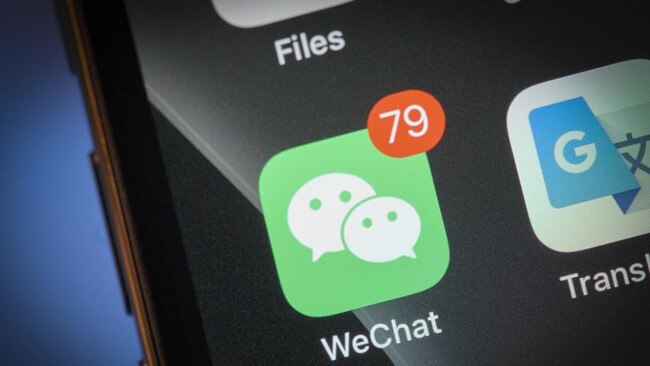WeChat ban in the balance due to risk of ‘surveillance, censorship and foreign interference’
The Chinese messaging app could be banned on government devices under a recommendation included in a parliamentary report probing how to combat foreign interference.

Chinese messaging app WeChat could be banned on government devices under a recommendation included in a parliamentary report probing how to combat foreign interference through social media.
A senate committee has recommended the Australian government consider extending a ban on video platform TikTok to WeChat over concerns they could be compelled under Beijing’s national security laws to “secretly co-operate” with Chinese intelligence agencies.
The report also recommended the federal government demand large social media platforms to “meet a minimum set of transparency requirements” or face financial penalties, with non-compliant services facing a blanket ban.

Committee chair James Paterson said foreign interference was now the nation’s principle national security concern, with foreign actors using increasingly “pervasive, insidious, subtle” tools to undermine democracy.
“Authoritarian regimes continue to threaten democratic societies through targeted disinformation campaigns that use social media to advance their strategic interests,” Senator Paterson said.
“Perpetrating states use these platforms to skew public debate, undermine trust in democratic institutions, and peddle false narratives.”
The senate inquiry – which held four public hearings and received 46 submissions – heard evidence from security experts that WeChat engaged in surveillance, censorship and foreign interference on its platform.
The report, released late on Tuesday, also recommended large social media companies should be required to have an Australian presence, proactively label state affiliated media and disclose foreign interference activity.
WeChat was the only platform that declined to appear before the committee and refused multiple requests to front the committee.
The provision that platforms would need to have an Australian presence would mean tech giants would be compelled to front future parliamentary committees. WeChat has no Australian-based employees, which meant the Senate was unable to compel the platform to participate.
The report’s release comes as Senator Paterson, a vocal critic of China and national security firebrand, accused the Chinese embassy of complaining to the Department of Foreign Affairs and Trade about the inquiry.
An official from DFAT’s China external and co-ordination branch emailed Senator Paterson’s committee secretariat seeking clarification about the parliament’s powers to compel foreign actors to front public hearings, The Australian revealed.
Social media giants Meta – which owns Facebook and Instagram – Twitter, TikTok, Google and YouTube fronted the committee during the inquiry.
On Tuesday, Senator Paterson criticised TikTok for failing to provide the legal basis upon which its employees would refuse to comply with Chinese law, after the committee heard that TikTok’s China-based employees can and have accessed Australian user data.




To join the conversation, please log in. Don't have an account? Register
Join the conversation, you are commenting as Logout